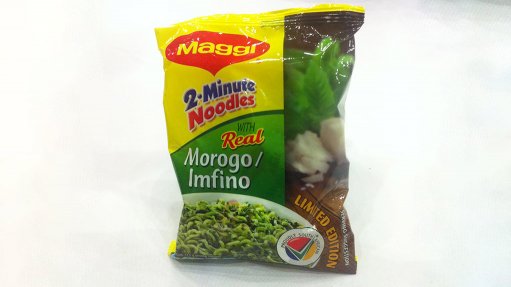
Photo by: Natalie Greve
After three years of collaborative research and product development centered on the potential health benefits, nutraceutical and functional food applications of various indigenous South African edible plants, a new instant noodle product flavoured with local plant Amaranthus – popularly known as Morogo – has been introduced to the market.
The launch of the new ‘Maggi 2 Minute Noodles with real Morogo’ was the result of public–private collaboration between consumer products group Nestlé South Africa, the Council for Scientific and Industrial Research (CSIR), the Agricultural Research Council (ARC), the University of Fort Hare and the Department of Science and Technology (DST).
The final selection of Amaranthus as the principal nutritional and flavouring agent was made following the screening of the nutrient bioavailability of various leafy green vegetables during digestion, including Cleome and Cow Pea.
Amaranthus was ultimately chosen as a result of its proven health benefits – particularly the presence of betacarotene, minerals and protein.
Addressing delegates at the launch of the product at the fifth CSIR Conference, in Pretoria, on Thursday, Science and Technology Minister Naledi Pandor described local knowledge of indigenous edible plants that had been passed on orally from generation to generation as a vital part of a nation's heritage.
“In South Africa, indigenous knowledge has massive potential for research, development and innovation. The DST is proud of this key milestone where we successfully translated academic research into an innovative commercial product which will be enjoyed by South African consumers,” she remarked.
Speaking about the council’s role in the partnership, CSIR strategic alliances and communication group executive Dr Rachel Chikwamba said the organisation had provided expertise in the processing of indigenous products in the joint development of the offering with food product development specialist Nestlé.
“Working with the ARC, production of the vegetable ingredients will [also] provide an opportunity for small-scale farmers. Our partnership with Nestlé is a great example of how public and private institutions can work together to address problems that are facing our country, such as unemployment.
“These types of partnerships play a critical role in ensuring that the CSIR and industry support the implementation of the bioeconomy strategy in its objective to have the bioeconomy contribute to the national gross domestic product by 2030,” she asserted.
ARC head Dr Shadrack Moephuli added that the partnership resulted in the development of efficient agronomic practices and farming guidelines for the plant by local farmers and aligned with the council’s objective to broaden the food base to achieve food and nutrition security through food science and technology development for improved product quality and yield.
“We also evaluated the commercial viability of producing African leafy vegetables in a sustainable manner for commercial and smallholder farmers under irrigated conditions,” he commented.
Nestlé South Africa corporate affairs director Ravi Pillay added that the addition of the product was indicative of the group’s ambition of becoming the leader in nutrition, health and wellness by leveraging "global expertise for local preference".